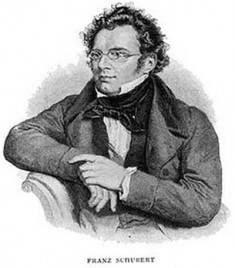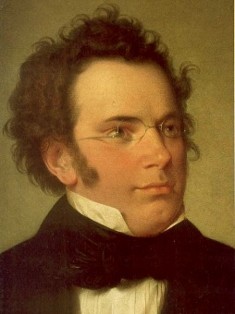| Franz Schubert | |
|---|---|
 |
|
| Composer | |
| Specialty | Symphonies, liturgical music, operas, incidental music, chamber, solo piano music |
| Born | Jan. 31, 1797 |
| Died | Nov. 19, 1828 |
| Nationality | Austrian |
Franz Schubert was an Austrian composer. Despite his short life, he produced hundreds of works, in particular the romantic songs known as Lieder. He also composed ten symphonies, operas, and much else. Schubert was not particularly famous during his own lifetime, but from shortly after his death onward he became recognized as among the finest of the early Romantic-era composers. Many of his compositions remain among the most popular from the early 19th century.
Early Life
Schubert was born in Vienna on January 31, 1797. His father was a school teacher and his mother was a household servant. He showed his gift for music at an early age and was encouraged in his musical studies by his family. His father and older brother taught him to play the violin, and he also received tutoring from the organist at his local church.
He passed the exam required for entry into the Imperial Court Chapel Choir in 1808, also entering the Royal Seminary. He found being away from home hard, but he was an exceptionally capable student. He studied the music of composers such as Beethoven, Mozart, and Haydn. When his voice broke at the age of 15, he left the choir and began to study under Antonio Saleri.
Early Musical Works
Among Schubert’s first major works was the 1814 piece Gretchen am Spinnrade, which was based on Goethe’s Faust. He went on to produce the first of his ten symphonies, as well as his debut Mass. He also set several songs to music, and by the end of the year he had become an assistant tutor at the school run by his father.
In this capacity, he came into contact with a wide range of people, including actors, singers, and poets. Some of these he befriended and asked them to perform the works he had written at small private concerts, given either in their own homes or in houses owned by rich friends.
Growing Musically
 In 1815, Schubert wrote the Erlkönig, a remarkable ballad again based on the work of Goethe. This work combined dissonance, modulations, and ever-shifting accompaniment to produce a thrilling effect. The song, which tells the story of four main characters, is considered one of the finest of his earlier works.
In 1815, Schubert wrote the Erlkönig, a remarkable ballad again based on the work of Goethe. This work combined dissonance, modulations, and ever-shifting accompaniment to produce a thrilling effect. The song, which tells the story of four main characters, is considered one of the finest of his earlier works.
He went on to write four further symphonies while still working at his father’s school. It was also during this period that Schubert composed a large number of dances, particularly waltzes. Although he was not especially famous during his lifetime, he was known for his Austrian Ländler waltzes.
In 1817, Schubert became a lodger at his friend Franz von Schober’s house. Here, he composed a number of piano sonatas, a new form to him since his father had not owned a piano. Schubert was willing to experiment somewhat with these pieces, especially in terms of key juxtaposition.
By the end of the year, he had also published about 50 songs. In the summer, he was made a member of Count Esterhazy’s family household. They spent their winters at a country estate and their summers in Hungary. It was there that Schubert wrote many of his piano duets. By 1823, his work can be considered mature: he had two operettas performed in public and his songs were sometimes sung professionally.
Later Years
In 1821, while on a sojourn in the country with Schober, Schubert wrote his only major opera, Alfonso und Estrella. Returning to Vienna, he was introduced to the works of Shakespeare by Edward Bauernfeld. Musically, he was still highly active: he produced a Mass in A flat in 1822, then started work on a symphony in B minor.
For reasons that remain obscure, only two of its five movements were completed, with the other three being left in sketch form. This is known today as his Unfinished Symphony. By now his health was failing, possibly as a result of his having contracted syphilis.
In his last years, Schubert concentrated on writing chamber music, as well as putting on what were known as Schubertiads: evening events at which his songs were sung. His health briefly improved, but by 1826, he was ill once again. Nevertheless, he produced several of his most enduring works during this period, including his Piano Sonata in G and String Quartet in G.
When Beethoven died in 1827, Schubert acted as a funeral torchbearer. The following year, he composed one further symphony, a piano duet, a Mass, and a number of songs. In March, he attended the only major public concert of his music held during his lifetime. He died of typhoid on November 19, 1828.